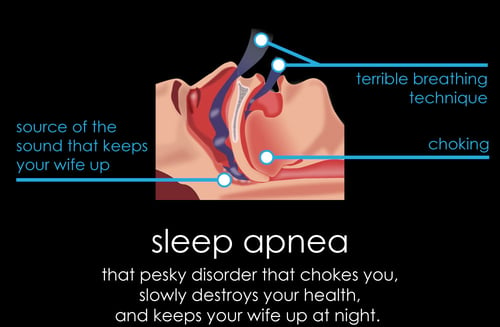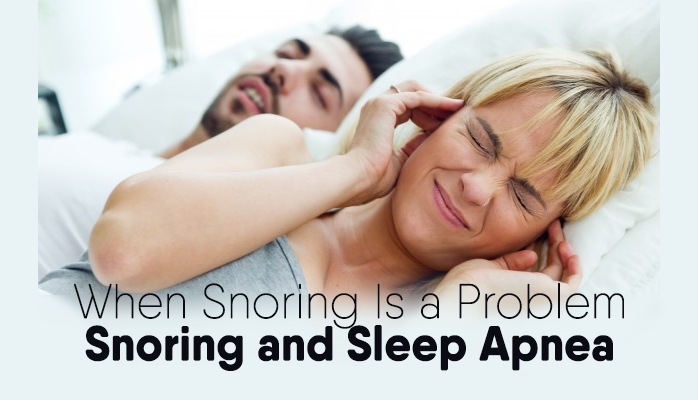When Snoring is a Personal Problem, Not Just a Nuisance
Is your or your partner’s snoring the primer for family jokes? Does your loud snoring require come with an “earplugs required” caveat for your partner? Is your snoring the rule, not the exception?
Chronic, loud snoring may be a bigger personal problem than just a nuisance for other people who have to listen to your nightly nasally noises. In other words, while their sleep might be disrupted, your snoring might be caused by a medical condition called sleep apnea, which can have significant health consequences. Or, maybe you are just a loud, chronic snorer.
Knowing the difference and telltale signs between loud snoring and sleep apnea is important, as identifying the potential problem underlying your chronic snoring is the first step to getting healthy again.
What is Obstructive Sleep Apnea (OSA)
Obstructive sleep apnea is a sleeping disorder and medical condition where you repeatedly stop breathing many time throughout the night due to some kind of physical ‘obstruction’ in your airway. Namely, this obstruction is often your throat closing, though your tongue or tonsils may also contribute to the airway being blocked.
OSA happens when the throat muscles in the back of your throat relax, causing the airway to narrow and your tongue to cleave to the back of your mouth, instigating snoring and a closed airway. When this happens you stop breathing and eventually rouse awake to begin breathing again, but you likely won’t remember ever waking up during the middle of the night.
 When your throat becomes closed, you breath in through your nose, causing snoring.
When your throat becomes closed, you breath in through your nose, causing snoring.
Eventually your airway becomes blocked, and you stop breathing
This process can happen many times per hour:
- Mild OSA: 5-14 apneas per hour of sleep
- Moderate OSA: 15-30 apneas per hour of sleep
- Severe OSA: 30+ apneas per hour of sleep
The risks are still the same with mild, moderate, and severe OSA, namely: lower quality of life, lower life expectancy, heart disease, and so on. The only difference may be the prevalence of the symptoms. It is much more common in men than women.
What Can Cause Snoring
Snoring can be caused by:
- Being overweight
- Genetics
- Smoking
- Alcohol
- OSA
- Sleeping on your back
The point is this: snoring doesn’t always mean you have OSA. Fixing your snoring can be as simple as learning to sleep on your back, or it could mean getting a sleep study, diagnoses, and wearing a CPAP device.
Weighing in weather your chronic snoring is causes by sleep apnea is matter of identifying other symptoms of OSA in conjunction with the your chronic snoring.
Signs Snoring is Caused by Obstructive Sleep Apnea
Besides snoring, other telltale signs of signs of obstructive sleep apnea are:
- Bed partner hears you repeatedly stop breathing throughout night
- Wake up exhausted
- Wake up with headaches
- Mood disruptions such as constant irritability
- Low stress management
- Struggles with depression or anxiety
Risk factors go up for sleep apnea if you:
- Are obese
- Have diabetes
Diagnosing Snoring as Being Caused By Sleep Apnea
Bed partners can be instrumental in helping you identify that your snoring may be caused by OSA. As many bed partners can attest to, they could sit and count the seconds while their untreated OSA partner doesn’t breath throughout the night.
This can be a bit trickier without a bed partner, because you will have to identify other OSA symptoms that you may or may not be struggling with. If you live in Alaska and are concerned that you have OSA, getting a diagnoses is straightforward:
- Contact our sleep center or your healthcare practitioner
- Get a referral to get a sleep study (usually covered by insurance)
- Book appointment and conduct sleep study
- Our sleep center sends the results to your healthcare practitioner, who will discuss treatment options
CPAP devices as a treatment for OSA stop the snoring, which means a better night for you and anyone sleeping in your vicinity.


